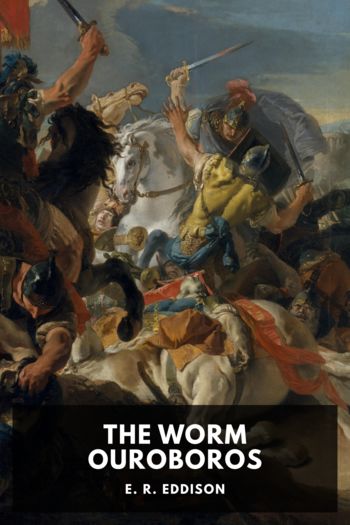The Worm Ouroboros by E. R. Eddison (nonfiction book recommendations TXT) 📕

- Author: E. R. Eddison
Book online «The Worm Ouroboros by E. R. Eddison (nonfiction book recommendations TXT) 📕». Author E. R. Eddison
The Queen watched Lord Juss as his gaze moved to the left past Koshtra Pivrarcha, past the blunt lower crest of Gôglio, to a great lonely peak many miles distant that frowned over the rich maze of nearer ridges which stood above the lake. Its southern shoulder swept in a long majestic line of cliffs up to a clean sharp summit; northward it fell steeplier away. Little snow hung on the sheer rock faces, save where the gullies cleft them. For grace and beauty scarce might Koshtra Belorn herself surpass that peak: but terrible it looked, and as a mansion of old night, that not high noonday could wholly dispossess of darkness.
“There standeth a mountain great and fair,” said Lord Brandoch Daha, “which was hid in cloud when we were on the high ridges. It hath the look of a great beast couchant.”
Still the Queen watched Lord Juss, who looked still on that peak. Then he turned to her, his hands clenched on the buckles of his breastplates. She said, “Was it as I think?”
He took a great breath. “It was so I beheld it in the beginning,” he said, “as from this place. But here are we too far off to see the citadel of brass, or know if it be truly there.” And he said to Brandoch Daha, “This remaineth, that we climb that mountain.”
“That can ye never do,” said the Queen.
“That shall be shown,” said Brandoch Daha.
“List,” said she. “Nameless is yonder mountain upon earth, for until this hour, save only for me and you, the eye of living man hath not looked upon it. But unto the Gods it hath a name, and unto the spirits of the blest that do inhabit this land, and unto those unhappy souls that are held in captivity on that cold mountain top: Zora Rach nam Psarrion, standing apart above the noiseless lifeless snowfields that feed the Psarrion glaciers; loneliest and secretest of all earth’s mountains, and most accursed. O my lords,” she said, “Think not to climb up Zora. Enchantments ring round Zora, so that ye should not get so near as to the edges of the snowfields at her feet ere ruin gathered you.”
Juss smiled. “O Queen Sophonisba, little thou knowest our mind, if thou think this shall turn us back.”
“I say it,” said the Queen, “with no such vain purpose; but to show you the necessity of that way I shall now tell you of, since well I know ye will not give over this attempt. To none save to a Demon durst I have told it, lest heaven should hold me answerable for his death. But unto you I may with the less danger commit this dangerous counsel if it be true, as I was taught long ago, that the hippogriff was seen of old in Demonland.”
“The hippogriff?” said Lord Brandoch Daha. “What else is it than the emblem of our greatness? A thousand years ago they nested on Neverdale Hause, and there abide unto this day in the rocks the prints of their hooves and talons. He that rode it was a forefather of mine and of Lord Juss.”
“He that shall ride it again,” said Queen Sophonisba, “he only of mortal men may win to Zora Rach, and if he be man enough of his hands may deliver him we wot of out of bondage.”
“O Queen,” said Juss, “somewhat I know of grammarie and divine philosophy, yet must I bow to thee for such learning, that dwellest here from generation to generation and dost commune with the dead. How shall we find this steed? Few they be, and high they fly above the world, and come to birth but one in three hundred years.”
She answered, “I have an egg. In all lands else must such an egg lie barren and sterile, save in this land of Zimiamvia which is sacred to the lordly races of the dead. And thus cometh this steed to the birth: when one of might and heart beyond the wont of man sleepeth in this land with the egg in his bosom, greatly desiring some high achievement, the fire of his great longing hatcheth the egg, and the hippogriff cometh out therefrom, weak-winged at first as thou hast seen a butterfly new-hatched out his chrysalis. Then only mayst thou mount him, and if thou be man enow to turn him to thy will he shall bear thee to the uttermost parts of earth unto thine





Comments (0)